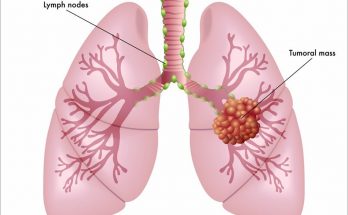Chronic obstructive pulmonary disease or COPD is a common lung disease that makes it difficult to breathe.
COPD is caused by damage to the lungs over the course of many years; most commonly, this damage is the result of years of smoking, although there can be other causes.
COPD is typically a combination of two diseases – chronic bronchitis and emphysema. Chronic bronchitis is different from regular bronchitis because it is recurs often. Chronic bronchitis occurs when the airways that transport air to the lungs become inflamed and produce excess amounts of mucus, which can block or restrict the airway, making it hard to breathe. Emphysema is characterized by shortness of breath. Tiny air sacs in the lungs that are much like balloons expand and retract as you breathe; in a person with emphysema, these important air sacs are damaged and fail to stretch like they should, which results in less air getting into and out of your lungs – which causes the shortness of breath that many persons who are afflicted with COPD complain of.
The symptoms of COPD become worse over time; sadly, the damage to the lungs that cause COPD is irreversible. Treatment of COPD involves preventing further damage and taking steps to in order to feel better physically.
Causes of COPD
COPD, as mentioned above, is typically caused from smoking because breathing in the smoke from tobacco over the course of many years irritates the airways and works to destroy the lung’s stretchy fibers. But there are other causes of COPD, such as breathing chemical fumes, air pollution, and dust for an extensive period of time. Secondhand smoke is also a cause of COPD in some patients. Some people who suffered from serious infections of the lung as a child are prone to get COPD, as are those who have a disorder known as Alpha-1 Antitrypsin Deficiency – although the latter is quite rare. COPD takes a long time to develop – usually many years pass before damage to the lungs will lead to COPD. Most people with COPD are older than sixty when they are diagnosed.
Symptoms of COPD
Most people who suffer from COPD have what is referred to as a “smoker’s cough”, although COPD sufferers who have never smoked will also usually have a chronic cough. Coughing in the COPD sufferer will produce mucus that is “coughed up”. Shortness of breath that becomes worsened by exercise is also a symptom of COPD. As the condition worsens, some people with COPD may become short of breath when they attempt daily activities like cooking, dressing, or showering; as a result, exercise becomes much harder, and takes a lot of energy. Many people with COPD lose weight and feel fatigued much of the time. COPD symptoms may flare up suddenly at times and become more obvious – which is called COPD exacerbation; these flare-ups or exacerbations can be anywhere from mild to life threatening. As COPD advances, COPD exacerbations become more profound and more severe.
Diagnosing COPD
Diagnosing COPD usually involves a physical examination by your doctor, who will listen to your lungs and ask questions regarding your health history, and particularly, if you are a smoker or have been exposed to known lung irritants. Your doctor may also perform “breathing” tests to determine how well your lungs are functioning. Chest x-rays and other diagnostic exams may be administered in order to determine if anything other than COPD may be causing the symptoms that you are experiencing. The earlier that COPD is diagnosed, the sooner you can begin to work to slow the damage to your already weakened lungs and prevent further damage from occurring.
Treating COPD
It is imperative that those who suffer from COPD stop smoking immediately, even if COPD is in an advanced stage (it’s never too late to quit). Even if you have smoked for decades, stopping smoking now is the only way to slow the progression of COPD and stop the continual, daily damage to your lungs. Stopping smoking is not easy, but there are treatment options that can help; discuss those with your doctor. In addition to stopping smoking, you may be given medicine that will help you breathe better, such as inhalers or other medication. There are also pulmonary rehabilitation programs that can help you discover the best ways to manage your COPD. Those with advanced COPD may need to use oxygen therapy at home, either at night, occasionally, or all the time.
